If you’re wondering about the best fruits to treat your feathered friends to, you’re in for a treat yourself.
In this article, I’m diving into the delightful world of parakeet nutrition and answering the question: What fruits can parakeets eat?
Get ready to discover the juicy goodness that can keep your parakeet chirping with joy.
Let’s jump right in and explore the fruity options that’ll have your feathered companions wagging their tails – or should I say, flapping their wings!
What Fruits Can Parakeets Eat?
- Oranges
- Watermelon
- Apples
- Strawberries
- Grapes
- Bananas
- Coconut
- Pineapple
- Mango
- Cherries
- Berries
1. Oranges
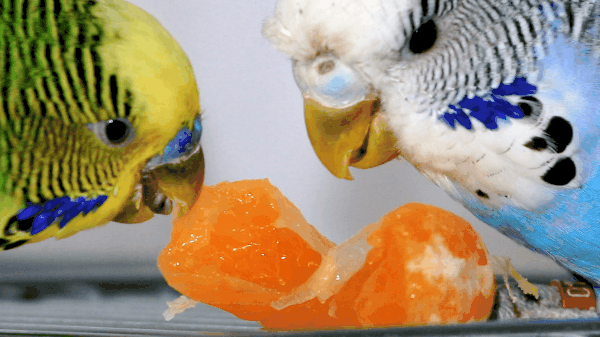
Oranges are sound fruits, and they are acceptable to take care of parakeets as they love the taste of an orange.
You can take care of them with oranges a few times per week as they are healthy fruit for parakeets but keep the quantity moderate as they have a high amount of sugar.
It is because of the high fructose in the orange, so your bird may not feel great on the off chance that it eats excessively.
Orange Nutritional Values
| Name | Amount |
| Energy | 8 Calories |
| Protein | 0.16 g |
| Carbohydrates | 2 g |
| Of which sugars | (1.59 g) |
| Fiber | 0.408 g |
| Calcium | 6.8 mg |
| Magnesium | 1.7 mg |
| Potassium | 30.8 mg |
| Selenium | 0.085 µg |
| Vitamin C | 9.04 mg |
| Vitamin A | 1.87 µg |
| Folate | 5.1 µg |
2. Watermelons
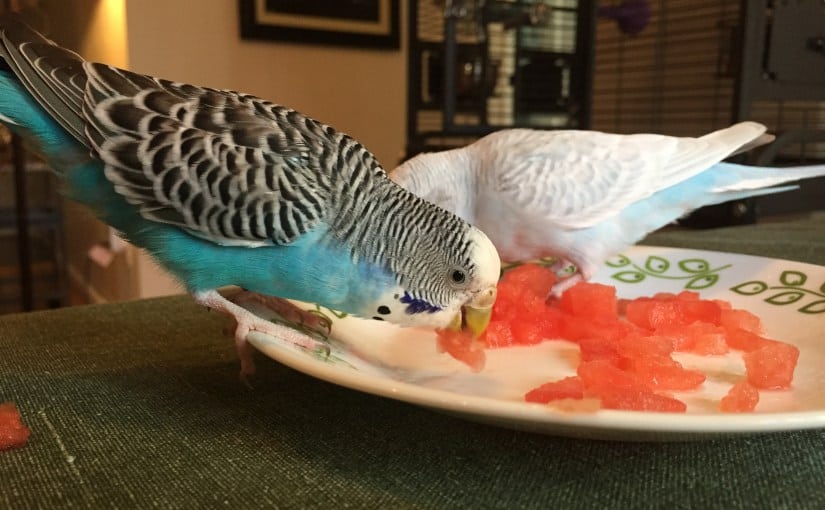
Watermelon has bunches of dietary benefits present in them, including minerals and nutrients that are extremely solid for a parakeet.
This is a good fruit that a parakeet can eat without any trouble.
Parakeets can feed on little bits of watermelons every day on the off chance that they are taken care of.
It should also be provided in a restricted amount.
Watermelon Nutritional Values
| Nutrients | Quantity |
| Vitamin A | 569 IU |
| Vitamin C | 8.2 g |
| Vitamin E | 0.05 g |
| Folates | 3 mcg |
| Niacin | 0.178 mg |
| Pantothenic acid | 0.226 mg |
| Pyridoxine | 0.043 mg |
| Thiamin | 0.034 mg |
| Sodium | 1 mg |
| Potassium | 112 mg |
| Calcium | 7 mg |
| Iron | 0.12 mg |
| Copper | 42 mcg |
| Magnesium | 10 mg |
| Manganese | 0.037 mg |
| Zinc | 0.11 mg |
| Carbohydrates | 7.6 g |
| Protein | 0.6 g |
| Total fat | 0.15 g |
| Dietary fibers | 0.4 g |
| Energy | 30 kcal |
3. Apples
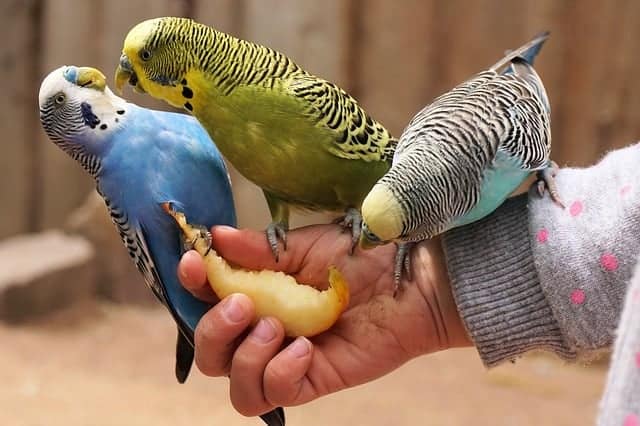
Apples are sound natural products that can prove to be the best fruit that a parakeet can eat.
They give important sustenance to your bird’s body and keep it dynamic all through the day.
One thing that any bird owner should be cautious about is that they are required to keep their parakeets from apple seeds.
It is because these seeds are toxic to parakeets.
Apple Nutritional Values
| Nutrients | Quantity |
| Vitamin A | 54 IU |
| Vitamin C | 4.6 g |
| Vitamin E | 0.17 g |
| Niacin | 0.090 mg |
| Riboflavin | 0.027 mg |
| Pyridoxine | 0.042 mg |
| Thiamin | 0.017 mg |
| Sodium | 1 mg |
| Potassium | 107 mg |
| Calcium | 6 mg |
| Iron | 0.13 mg |
| Magnesium | 5 mg |
| Phosphorous | 11 mg |
| Zinc | 0.03 mg |
| Carbohydrates | 13.82 g |
| Protein | 0.25 g |
| Dietary fibers | 2.40 g |
4. Strawberries
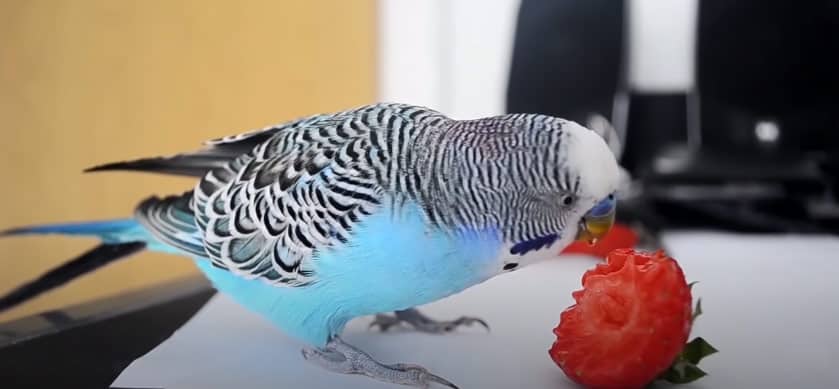
Strawberries are exceptionally plentiful in minerals and nutrients that can prove to be good fruits that a parakeet can eat to stay healthy.
Strawberries provide good strength to any living life form.
Parakeets can be taken care of with strawberries as strawberries predominantly comprise of water.
Because of the high water content, strawberries keep the parakeets hydrated as well.
Strawberry Nutritional Value
| Name | Amount |
| Energy | 5 calories |
| Protein | 0.12g |
| Carbohydrates | 1.3 g |
| Magnesium | 2.34 |
| Fiber | 0.36 g |
| Potassium | 27.5 mg |
| Vitamin C | 10.6 mg |
| Vitamin A | 0.18 µg |
| Folate | 4.32 µg |
5. Grapes
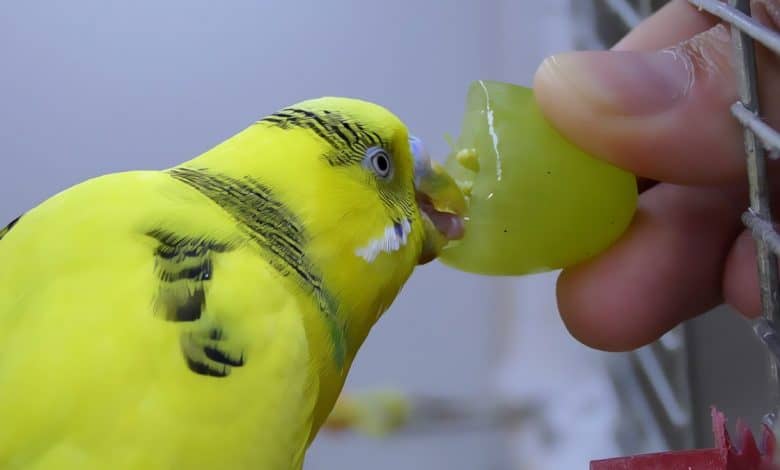
Grapes are a good fruit to feed to parakeets because they are also rich in minerals like Manganese and Potassium that are fundamental for each living being.
A parakeet can get Vitamin A, Vitamin C, and Vitamin K which are typically excellent for the well-being of a parakeet.
Grapes Nutritional Values
| Name | Amount |
| Calories | 104 |
| Protein | 1.1g |
| Carbohydrates | 27.3 g |
| Manganese | 5% of RDI |
| Fiber | 1.4 g |
| Potassium | 8% of RDI |
| Vitamin C | 27% of RDI |
| Vitamin K | 28% of RDI |
| Fat | 0.2 g |
6. Bananas
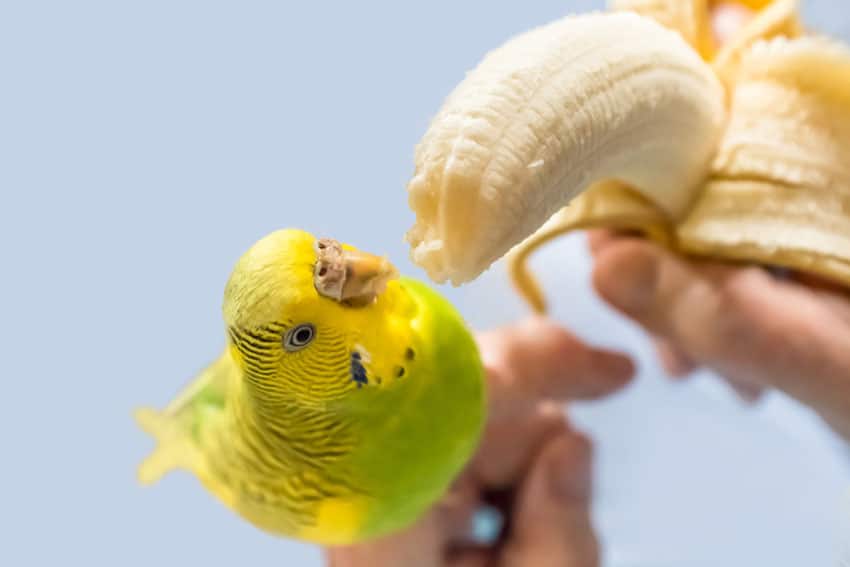
Banana is as beneficial for parakeet as it is for human beings.
Parakeets can eat a banana as in general, it gives more health benefits than other fruits that you feed to a parakeet.
Having a high number of Folate in bananas implies that it is generally excellent for creating tissues in the body, and it is likewise fundamental for cell growth.
Banana Nutritional Values
| Name | Amount |
| Calories | 110 Calories |
| Protein | 1.00 g |
| Carbohydrates | 28 g |
| Sugar | 15 g |
| Fiber | 3 g |
| Potassium | 450 mg |
| Vitamin C | 8.7 mg |
| Vitamin A | 64 IU |
| Fat | 0 g |
Fresh foods grown from the ground are a significant piece of your parakeet’s eating routine and should shape around 20 to 25 percent of it.
Offer him new food consistently, like a piece of apple or carrot, bean fledglings, spinach, and dandelion leaves.
There’s no compelling reason to strip vegetables, yet you should wash them completely and slash them little enough for him to eat.
About a teaspoon of fresh food daily is necessary for a parakeet.
Parakeets Feeding Behavior
In the wild, your parakeet would ordinarily scrounge for food during the early morning hours and just before sunset.
Since you give all the food he needs, he’s substantially more prone to indulge than he would be in the case that he needed to search out his own food.
In case you feed the parakeet with a similar seed blend or pellets consistently, he may likewise get exhausted and get tired of eating the same item.
Your parakeet likewise might be more inclined to gorge in case you feed him a seed-based eating regimen on a daily basis.
Seeds have high fat and low protein than pellets, so even a limited quantity is high in calories.
What Other Food Items Can Parakeet Eat?
Parakeets have their needs in case of nutritional values and minerals to stay healthy and active.
They can only rely on fruits all the time, so you should know what other food items other than fruits can parakeets eat.
Here are some suggestions that you can feed to parakeets other than fruits.
1. Seeds
Seeds are good food for the health of a parakeet as they don’t affect its health, and they are very light in the diet.
They can eat 1/2 to 2 level tablespoons of seeds in a day.
In the wild, parakeets eat seeds from a wide assortment of plants each season; however, the exclusive seed has a more restricted reach.
Out of those couple of sorts of seed, parakeets frequently pick just their top choices, like millet and sunflower, and this prompts dietary lacking in them.
Seeds ought to be just a single piece of your parakeet’s eating regimen.
2. Pellets
The ideal food for your parakeet is pellets, and as a pet owner, it’s your job to encourage him to eat it.
Keep in mind that Pellets should be filling 75 to 80 percent of his diet.
Parakeets don’t have a big appetite, so they only eat less food quantity of about one-quarter cup of pellets a day.
Make sure you buy from trusted and verified sources to get proper healthy pellets for your parakeet.
3. Quality Seed Mixes
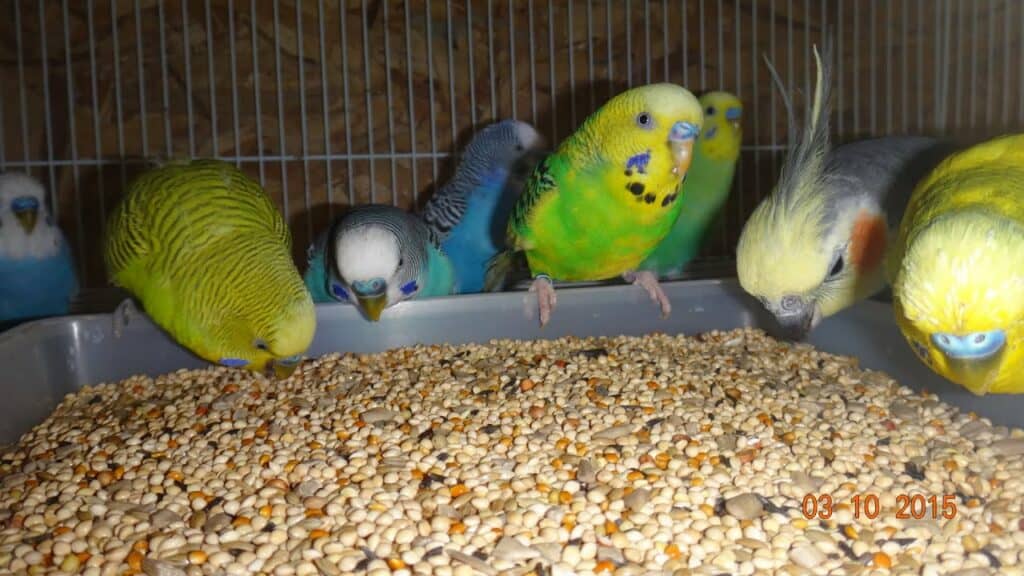
Quality seed mixes should be included in your parakeet’s diet with seed varieties and other food items like nuts, fruits, and vegetables to give it maximum vitamins A, B, C, D, E, and K which are good sources of calcium and protein nutrients.
4. Raw Vegetables
Raw vegetables can also be used as food items to feed your parakeet.
They are excellent in providing nutrition for your parakeet as it will help them in the development of their body and bones.
These vegetables also help in digestion and better blood circulation in the body of the parakeet.
Leafy green vegetables like parsley, carrot, lettuce, squash, and cucumbers are the most healthiest and commonly consumed raw vegetables by parakeets.
Other Foods
Any food item that is healthy and nutritious for human beings is also healthy for parakeets.
You must know that any junk food and food that is high in sugar values or fat are not good for your parakeet.
Some other food items that prove to be good for a parakeet are eggs, lean-cooked meat, and fish.
Parakeets can also rely on berries like blueberry, strawberry, or blackberries.
It depends on the interest of your parakeet, what it likes to eat, and whatnot, but mostly, all parakeets love eating the mentioned food in this article.
Do Parakeets Overeat?
At the point when you sense that your parakeet is looking somewhat on the full side, overeating could be the reason.
Since it can prompt significant medical conditions, it’s dependent upon you to assume responsibility for your bird’s dietary patterns to ensure he doesn’t glut himself.
Preventing Overeating Fruits of Parakeets
Taking care of your bird with a wide scope of food sources on a timetable that coordinates with his normal appetite indications can help keep your bird fit as a fiddle.
This normally implies offering a pellet-based eating routine or seed mixture two times a day, at around dusk and dawn, at that point eliminating the food after your bird has got done with eating.
Parakeets need new food items with time as they may get bored with the same eating routine.
You should understand their eating patterns and offer them tasty and fun food sources that your little companion can pull on and play with fulfill his need to work for his food.
Make sure you don’t feed the parakeet with a certain food item that he likes the most.
Your parakeet may not stop eating what he likes the most, but you should be aware of his diet and his health to keep giving him the food quantity in moderation so that your bird may not get sick.
Conclusion
To wrap things up, it’s clear that parakeets can enjoy a variety of fruits that not only tantalize their taste buds but also provide essential vitamins and nutrients.
By incorporating safe options like apples, pears, berries, and melons into their diet, we contribute to their overall health and well-being.
Remember, moderation is key, and ensuring that fruits are fresh, clean, and free of seeds will keep our parakeet pals thriving.
With this newfound knowledge about the fruit-filled world of parakeet nutrition, you’re all set to treat your feathered companions to a colorful array of flavors.
Here’s to happy, healthy, and fruity adventures for you and your parakeet friends!
FAQ
Can parakeets eat fruits?
Yes, parakeets can enjoy a variety of fruits as part of their diet. Fruits offer essential vitamins, minerals, and a burst of flavors that parakeets find enticing.
What are some safe fruits for parakeets to eat?
Safe fruits include apples, pears, berries (such as blueberries, strawberries, and raspberries), and melons. These fruits provide nutritional benefits and are generally well-tolerated by parakeets.
Should I remove seeds from fruits before offering them to my parakeet?
Yes, it’s important to remove seeds from fruits before offering them to your parakeet. Seeds, especially apple seeds and other citrus seeds, can be toxic to birds.
Can parakeets eat citrus fruits like oranges and lemons?
Citrus fruits are not recommended for parakeets. The high acidity of citrus fruits can upset their digestive system. Stick to safer options like apples and berries.
How often can I give fruits to my parakeet?
Fruits should be offered as treats or occasional supplements to their regular diet. One or two small pieces of fruit a few times a week is a good guideline.
Are dried fruits okay for parakeets?
Dried fruits should be avoided. They are often high in sugars and preservatives, which are not suitable for parakeets’ health.
Are there fruits that are toxic to parakeets?
Yes, some fruits are toxic and should be avoided. Avoid giving your parakeet fruits like avocado, which can be harmful.
Can I give my parakeet fruit juice?
It’s best to offer whole fruits rather than fruit juice. Fruit juice lacks fiber and can be too concentrated in sugars.
Last Updated on August 17, 2023 by Lily Aldrin
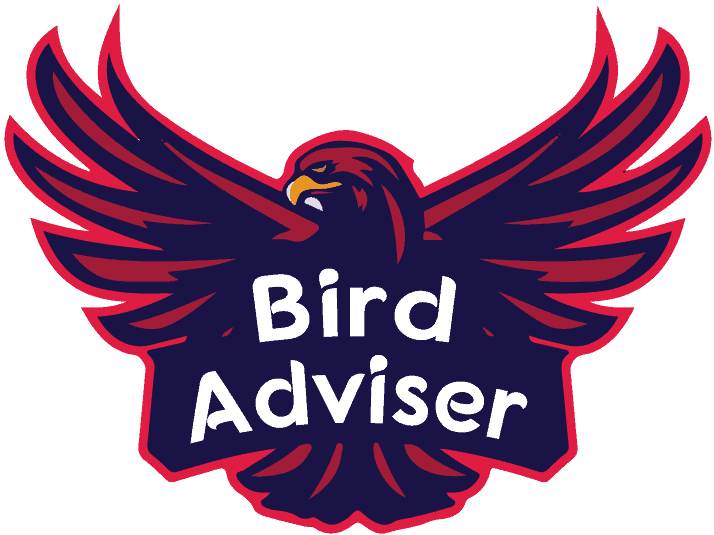
You website is very informative. I will be purchasing 2 male birds in the next month.